上外版(2020)选择性必修第四册 Unit 2 Learning about Trade and Economy Listening and Viewing 课件(共15张PPT)
文档属性
| 名称 | 上外版(2020)选择性必修第四册 Unit 2 Learning about Trade and Economy Listening and Viewing 课件(共15张PPT) |
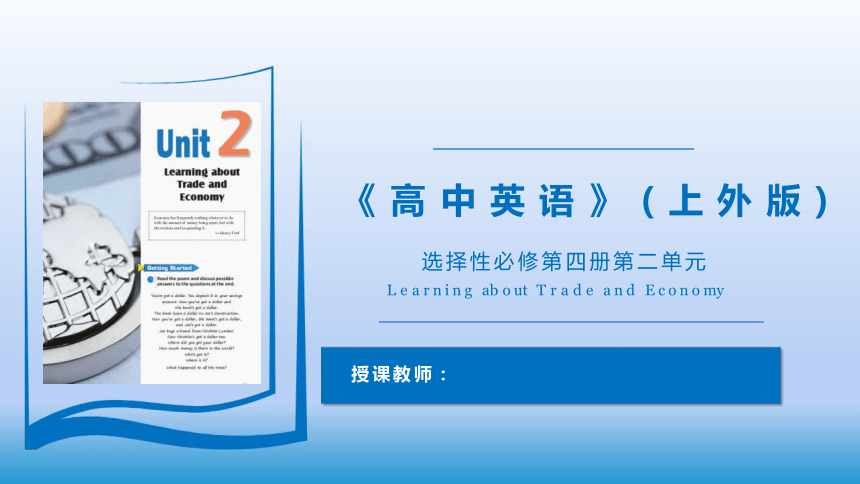
|
|
| 格式 | pptx | ||
| 文件大小 | 178.2KB | ||
| 资源类型 | 教案 | ||
| 版本资源 | 上外版(2020) | ||
| 科目 | 英语 | ||
| 更新时间 | 2024-09-06 21:50:17 | ||
图片预览

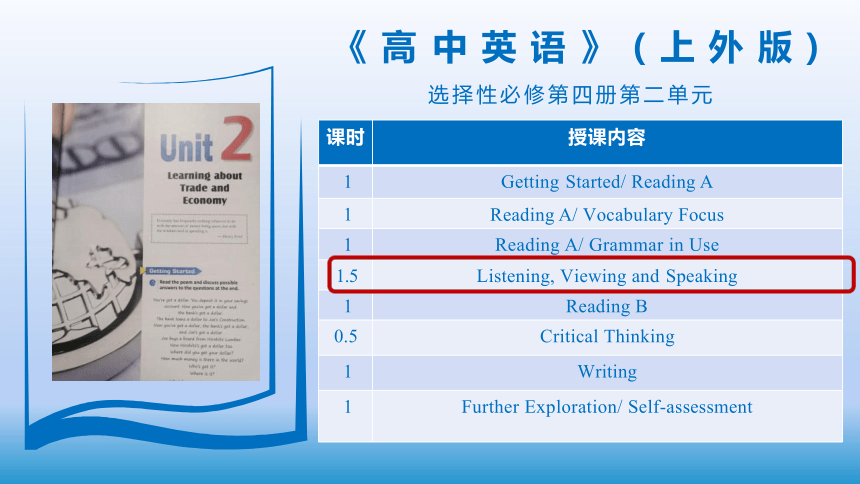
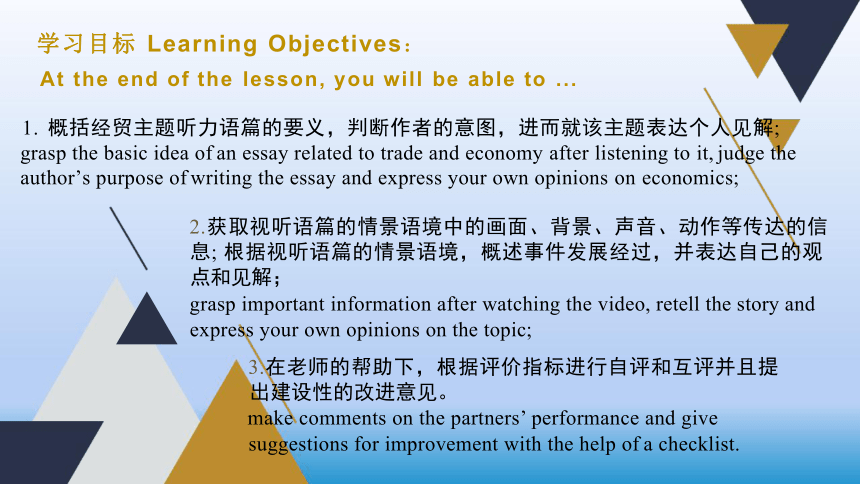
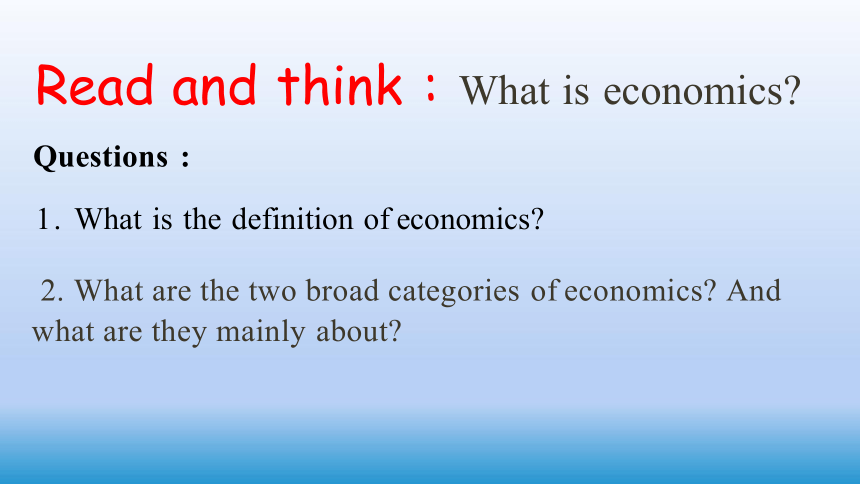
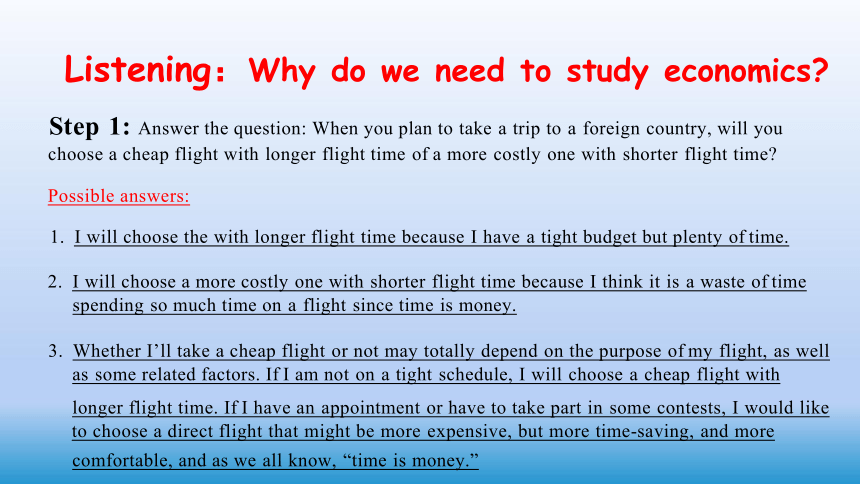
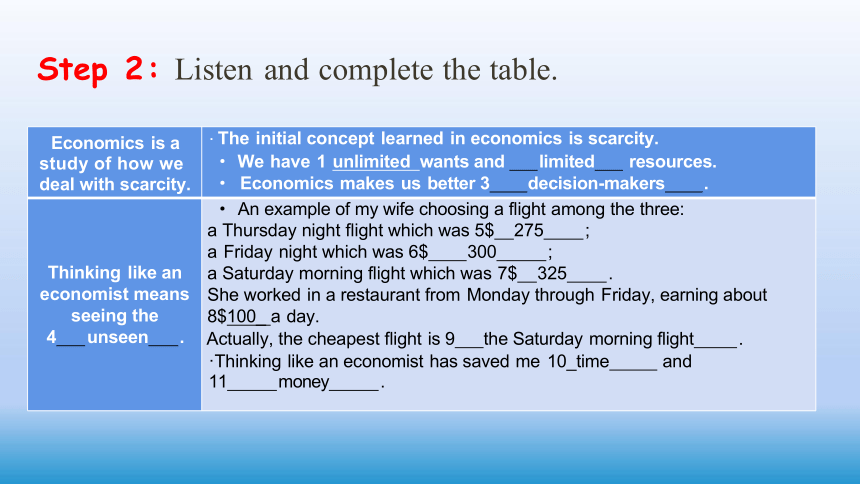
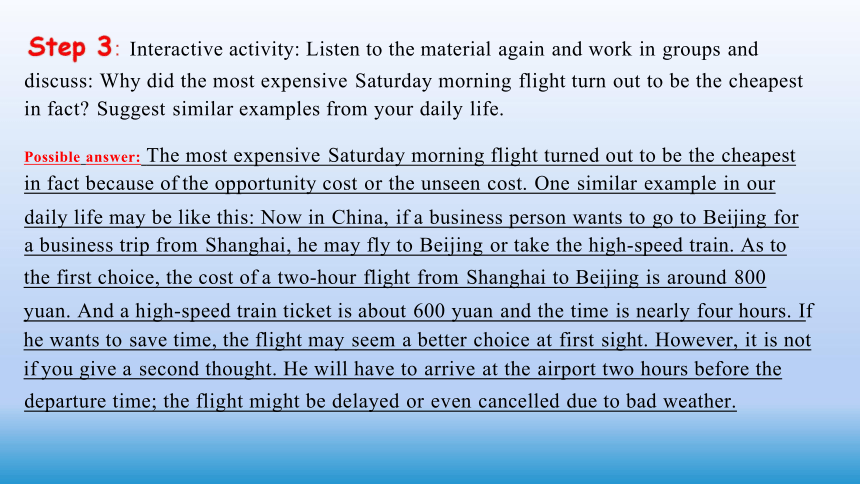
文档简介
(共15张PPT)
《 高 中 英 语 》 ( 上 外 版 )
选择性必修第四册第二单元
L e a r n i n g ab o ut T r a d e a n d E c o n o my
单元封面
授 课 教 师 :
课时
授课内容
1
Getting Started/ Reading A
1
Reading A/ Vocabulary Focus
1
Reading A/ Grammar in Use
1.5
Listening, Viewing and Speaking
1
Reading B
0.5
Critical Thinking
1
Writing
1
Further Exploration/ Self-assessment
单元封面
《 高 中 英 语 》 ( 上 外 版 )
选择性必修第四册第二单元
学习目标 Learning Objectives:
At the end of the lesson, you will be able to ...
1. 概括经贸主题听力语篇的要义,判断作者的意图,进而就该主题表达个人见解; grasp the basic idea of an essay related to trade and economy after listening to it, judge the author’s purpose of writing the essay and express your own opinions on economics;
grasp important information after watching the video, retell the story and
express your own opinions on the topic;
3.在老师的帮助下,根据评价指标进行自评和互评并且提 出建设性的改进意见。
make comments on the partners’ performance and give
suggestions for improvement with the help of a checklist.
2.获取视听语篇的情景语境中的画面、背景、声音、动作等传达的信 息; 根据视听语篇的情景语境,概述事件发展经过,并表达自己的观 点和见解;
Read and think : What is economics
Questions :
1. What is the definition of economics
2. What are the two broad categories of economics And what are they mainly about
Listening:Why do we need to study economics
Step 1: Answer the question: When you plan to take a trip to a foreign country, will you choose a cheap flight with longer flight time of a more costly one with shorter flight time
Possible answers:
1. I will choose the with longer flight time because I have a tight budget but plenty of time.
2. I will choose a more costly one with shorter flight time because I think it is a waste of time spending so much time on a flight since time is money.
3. Whether I’ll take a cheap flight or not may totally depend on the purpose of my flight, as well as some related factors. If I am not on a tight schedule, I will choose a cheap flight with
longer flight time. If I have an appointment or have to take part in some contests, I would like to choose a direct flight that might be more expensive, but more time-saving, and more
comfortable, and as we all know, “time is money.”
Economics is a study of how we deal with scarcity.
The initial concept learned in economics is scarcity.
· We have 1 unlimited wants and limited resources. · Economics makes us better 3 decision-makers .
Thinking like an economist means seeing the 4 unseen .
· An example of my wife choosing a flight among the three:
a Thursday night flight which was 5$ 275 ;
a Friday night which was 6$ 300 ;
a Saturday morning flight which was 7$ 325 .
She worked in a restaurant from Monday through Friday, earning about 8$100_ a day.
Actually, the cheapest flight is 9 the Saturday morning flight . ·Thinking like an economist has saved me 10_time and
11 money .
Step 2: Listen and complete the table.
·
: Interactive activity: Listen to the material again and work in groups and
discuss: Why did the most expensive Saturday morning flight turn out to be the cheapest in fact Suggest similar examples from your daily life.
Possible answer: The most expensive Saturday morning flight turned out to be the cheapest in fact because of the opportunity cost or the unseen cost. One similar example in our
daily life may be like this: Now in China, if a business person wants to go to Beijing for a business trip from Shanghai, he may fly to Beijing or take the high-speed train. As to
the first choice, the cost of a two-hour flight from Shanghai to Beijing is around 800
yuan. And a high-speed train ticket is about 600 yuan and the time is nearly four hours. If he wants to save time, the flight may seem a better choice at first sight. However, it is not if you give a second thought. He will have to arrive at the airport two hours before the
departure time; the flight might be delayed or even cancelled due to bad weather.
Viewing:How the Economy Really Works
Step 1:Read the short passage in the textbook and think about the ancient forms of money.
Culture link: Shell Money
The earliest recorded use of shells as currency was in China during the Shang Dynasty(1600BCE-1046BCE). The particular shells used were cowrie shells, called bei in Chinese. The cowrie shells were an intelligent solution for “small money” because they were collected in seas far in the south of China and only king could afford them.
1. What was the earliest recorded form of money in history
2. Why was it a good solution for small money
3. Can you list other forms of ancient money
Possible version for Question 3:
Besides cowrie shells in China, there were other forms of
currency in other parts of the world. Money has got a very colorful history. For example, feathers, cloth salt, cattle,
wheat and so on. In Roman times, Roman soldiers were
paid in salt, and that’s how we get the word salary, from the Latin sal for salt.
Step 2: Interactive activity: Discuss with your group members and present
your point of view: Do you agree that “Trade can make people better off”
Sample version:Yes, I agree that “Trade can make people better off” . It is impossible for anybody or any manufacturer to produce all the necessities they need in the daily life. But by trading with others, we can buy a greater variety of goods and services easily and at a lower cost. Trade enables people to specialize in what they do best and to enjoy a greater variety of goods and services.
Step 3: Viewing: Watch the video and answer the questions.
Questions:
1. What do people use to buy what they want on the island
2. What are the jobs of the four people in the video
3. How do all the people on the island become “rich” all of a sudden
4. Is wealth found in money Why or why not
Checklist
( ) 1. Are the jobs of the four people in the video accurately stated
( ) 2. Is the sequence of the story plots properly presented
( ) 3. Are the words, expressions and sentences in the short story properly used
( ) 4. Is the content of the video coherently stated
( ) 5.Does it clearly convey how money, goods and services flow among individuals in a society
Step 4: Interactive activity: Watch the video again and describe
how money, goods and services flow among individuals in a
society.
Possible version:
Each person has his own occupation and when he needs something he can’t produce himself, he buys it with a shell. When the builder wants a fish for
dinner, he buys one from a fisherman with a shell. With the same shell, the
fisherman buys a new shirt from the clothes maker, the clothes maker buys
some tomatoes from the farmer and the farmer buys the builder’s work to
add a room to his hut. The money situation has not changed since the builder has the same shell he started with. However, everyone got what they wanted. Everyone is “richer” or better off even though they don’t have any more
money.
Homework
1. Listen and view more about economics.
2. Find more examples of how economy really works in our daily life.
T h a n k y o u !
《 高 中 英 语 》 ( 上 外 版 )
选择性必修第四册第二单元
L e a r n i n g ab o ut T r a d e a n d E c o n o my
单元封面
授 课 教 师 :
课时
授课内容
1
Getting Started/ Reading A
1
Reading A/ Vocabulary Focus
1
Reading A/ Grammar in Use
1.5
Listening, Viewing and Speaking
1
Reading B
0.5
Critical Thinking
1
Writing
1
Further Exploration/ Self-assessment
单元封面
《 高 中 英 语 》 ( 上 外 版 )
选择性必修第四册第二单元
学习目标 Learning Objectives:
At the end of the lesson, you will be able to ...
1. 概括经贸主题听力语篇的要义,判断作者的意图,进而就该主题表达个人见解; grasp the basic idea of an essay related to trade and economy after listening to it, judge the author’s purpose of writing the essay and express your own opinions on economics;
grasp important information after watching the video, retell the story and
express your own opinions on the topic;
3.在老师的帮助下,根据评价指标进行自评和互评并且提 出建设性的改进意见。
make comments on the partners’ performance and give
suggestions for improvement with the help of a checklist.
2.获取视听语篇的情景语境中的画面、背景、声音、动作等传达的信 息; 根据视听语篇的情景语境,概述事件发展经过,并表达自己的观 点和见解;
Read and think : What is economics
Questions :
1. What is the definition of economics
2. What are the two broad categories of economics And what are they mainly about
Listening:Why do we need to study economics
Step 1: Answer the question: When you plan to take a trip to a foreign country, will you choose a cheap flight with longer flight time of a more costly one with shorter flight time
Possible answers:
1. I will choose the with longer flight time because I have a tight budget but plenty of time.
2. I will choose a more costly one with shorter flight time because I think it is a waste of time spending so much time on a flight since time is money.
3. Whether I’ll take a cheap flight or not may totally depend on the purpose of my flight, as well as some related factors. If I am not on a tight schedule, I will choose a cheap flight with
longer flight time. If I have an appointment or have to take part in some contests, I would like to choose a direct flight that might be more expensive, but more time-saving, and more
comfortable, and as we all know, “time is money.”
Economics is a study of how we deal with scarcity.
The initial concept learned in economics is scarcity.
· We have 1 unlimited wants and limited resources. · Economics makes us better 3 decision-makers .
Thinking like an economist means seeing the 4 unseen .
· An example of my wife choosing a flight among the three:
a Thursday night flight which was 5$ 275 ;
a Friday night which was 6$ 300 ;
a Saturday morning flight which was 7$ 325 .
She worked in a restaurant from Monday through Friday, earning about 8$100_ a day.
Actually, the cheapest flight is 9 the Saturday morning flight . ·Thinking like an economist has saved me 10_time and
11 money .
Step 2: Listen and complete the table.
·
: Interactive activity: Listen to the material again and work in groups and
discuss: Why did the most expensive Saturday morning flight turn out to be the cheapest in fact Suggest similar examples from your daily life.
Possible answer: The most expensive Saturday morning flight turned out to be the cheapest in fact because of the opportunity cost or the unseen cost. One similar example in our
daily life may be like this: Now in China, if a business person wants to go to Beijing for a business trip from Shanghai, he may fly to Beijing or take the high-speed train. As to
the first choice, the cost of a two-hour flight from Shanghai to Beijing is around 800
yuan. And a high-speed train ticket is about 600 yuan and the time is nearly four hours. If he wants to save time, the flight may seem a better choice at first sight. However, it is not if you give a second thought. He will have to arrive at the airport two hours before the
departure time; the flight might be delayed or even cancelled due to bad weather.
Viewing:How the Economy Really Works
Step 1:Read the short passage in the textbook and think about the ancient forms of money.
Culture link: Shell Money
The earliest recorded use of shells as currency was in China during the Shang Dynasty(1600BCE-1046BCE). The particular shells used were cowrie shells, called bei in Chinese. The cowrie shells were an intelligent solution for “small money” because they were collected in seas far in the south of China and only king could afford them.
1. What was the earliest recorded form of money in history
2. Why was it a good solution for small money
3. Can you list other forms of ancient money
Possible version for Question 3:
Besides cowrie shells in China, there were other forms of
currency in other parts of the world. Money has got a very colorful history. For example, feathers, cloth salt, cattle,
wheat and so on. In Roman times, Roman soldiers were
paid in salt, and that’s how we get the word salary, from the Latin sal for salt.
Step 2: Interactive activity: Discuss with your group members and present
your point of view: Do you agree that “Trade can make people better off”
Sample version:Yes, I agree that “Trade can make people better off” . It is impossible for anybody or any manufacturer to produce all the necessities they need in the daily life. But by trading with others, we can buy a greater variety of goods and services easily and at a lower cost. Trade enables people to specialize in what they do best and to enjoy a greater variety of goods and services.
Step 3: Viewing: Watch the video and answer the questions.
Questions:
1. What do people use to buy what they want on the island
2. What are the jobs of the four people in the video
3. How do all the people on the island become “rich” all of a sudden
4. Is wealth found in money Why or why not
Checklist
( ) 1. Are the jobs of the four people in the video accurately stated
( ) 2. Is the sequence of the story plots properly presented
( ) 3. Are the words, expressions and sentences in the short story properly used
( ) 4. Is the content of the video coherently stated
( ) 5.Does it clearly convey how money, goods and services flow among individuals in a society
Step 4: Interactive activity: Watch the video again and describe
how money, goods and services flow among individuals in a
society.
Possible version:
Each person has his own occupation and when he needs something he can’t produce himself, he buys it with a shell. When the builder wants a fish for
dinner, he buys one from a fisherman with a shell. With the same shell, the
fisherman buys a new shirt from the clothes maker, the clothes maker buys
some tomatoes from the farmer and the farmer buys the builder’s work to
add a room to his hut. The money situation has not changed since the builder has the same shell he started with. However, everyone got what they wanted. Everyone is “richer” or better off even though they don’t have any more
money.
Homework
1. Listen and view more about economics.
2. Find more examples of how economy really works in our daily life.
T h a n k y o u !
同课章节目录
